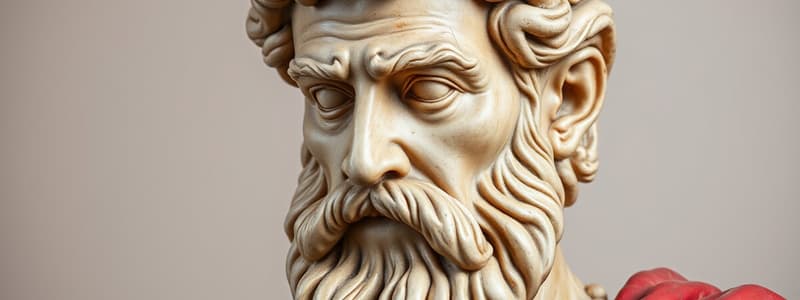Podcast
Questions and Answers
What did Socrates believe defines the true self?
What did Socrates believe defines the true self?
- Wealth and possessions
- Social status
- The soul (correct)
- Physical appearance
According to Plato, which part of the soul enables humans to think and reflect?
According to Plato, which part of the soul enables humans to think and reflect?
- Physical part
- Rational part (correct)
- Appetitive part
- Spirited part
What nature does Plato attribute to the soul?
What nature does Plato attribute to the soul?
- Monolithic
- Static
- Tripartite (correct)
- Dualistic
Which of the following quotes is attributed to Socrates?
Which of the following quotes is attributed to Socrates?
How does Socrates describe the physical part of the self?
How does Socrates describe the physical part of the self?
What role does the spirited soul play in human experience?
What role does the spirited soul play in human experience?
According to Aristotle, what is essential for a happy life?
According to Aristotle, what is essential for a happy life?
In Plato's view, how does the soul relate to the body?
In Plato's view, how does the soul relate to the body?
What does the appetitive soul allow individuals to experience?
What does the appetitive soul allow individuals to experience?
What does Aristotle suggest about the relationship between reason and the senses?
What does Aristotle suggest about the relationship between reason and the senses?
What is defined as true knowledge in the context of wisdom?
What is defined as true knowledge in the context of wisdom?
Which of the following best describes the Theory of the Golden Mean?
Which of the following best describes the Theory of the Golden Mean?
What is virtue associated with in the context provided?
What is virtue associated with in the context provided?
What role does information technology play in human resource management?
What role does information technology play in human resource management?
What does living in consonance with reason involve according to the Theory of Golden Mean?
What does living in consonance with reason involve according to the Theory of Golden Mean?
Flashcards are hidden until you start studying
Study Notes
Understanding the Self
Socrates (496-399 BC)
- Proposed a duality of the self: the physical, which is changeable and mortal, and the soul, which is eternal and unchanging.
- Asserted that true selfhood transcends material possessions, social standing, and physical appearance.
- Emphasized the importance of self-knowledge.
- Highlighted the significance of self-examination with the quote "The unexamined life is not worth living."
- Encouraged introspection through the maxim "Know thyself."
Plato (428-348 BC)
- Described the self as an immortal soul housed in a mortal body.
- Introduced the tripartite soul consisting of:
- Rational part: Associated with reasoning and intellect, located in the head.
- Spirited part: Linked to courage and willpower, located in the heart.
- Appetitive part: Drives physical desires, located in the abdomen.
- Stated that the soul vitalizes the body, asserting that the body is merely a vessel for the soul.
- Argued for the supremacy of wisdom and perfection as essential virtues.
Aristotle (384-322 BC)
- Defined the self as an integration of body and soul, mind and matter, sense and intellect, passion and reason.
- Proposed that reason should govern all aspects of life to achieve harmony and happiness.
- Believed neglecting reason leads to chaos, whereas its adherence fosters a fulfilling existence.
- Acknowledged the importance of physical, economic, and social development in achieving true happiness.
Theories of Happiness and Virtue
- Wisdom is identified as true knowledge, while virtue encompasses actions that support personal perfection and happiness.
- The Theory of Golden Mean emphasizes moderation in all aspects of life—avoiding excess and deficiency.
- Advocates living in accordance with reason for a balanced existence.
Human Resource Management Applications
- Use of e-recruitment platforms streamlines job procedures through active screening.
- E-selection aids in managing selection processes, ensuring candidates meet required qualifications.
- Incorporates technology, such as job boards, to facilitate broader applicant outreach.
Studying That Suits You
Use AI to generate personalized quizzes and flashcards to suit your learning preferences.




